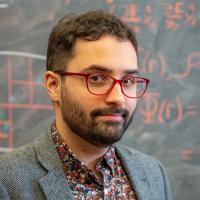Helen B. Warner Prize for Astronomy
The Warner Prize is normally awarded annually for a significant contribution to observational or theoretical astronomy during the five years preceding the award. It is given to an astronomer who has not attained 36 years of age in the year designated for the award or must be within eight years of receipt of their PhD degree (for the 2021 prize, for example, the recipient must have received their PhD in 2013 or later or must have been born in 1986 or later). The recipient shall be a resident of North America (including Hawaii and Puerto Rico) or a member of a North American institution stationed abroad.
Self-nominations are allowed, and all prize requirements must be met at the time of nomination.
Eligibility:
- The recipient shall be a resident of North America (including Hawaiʻiand Puerto Rico) or a member of a North American institution stationed abroad.
- Early career — It is given to an astronomer who has not attained 36 years of age in the year designated for the award or must be within eight years of receipt of their PhD degree. (Note: there is no exemption due to career interruptions.)
Criteria:
- significant contribution to observational or theoretical astronomy
- cited work done during the five years preceding the award.
Note: No individual candidate is eligible for both the Warner and Pierce Prizes.
Nominations are open and are due on 30 June.
View Nomination Checklist View Ethics Self-Disclosure Form

2024 - Carl Rodriguez

2023 – Ana Bonaca

2022 – Brett McGuire

2021 – Rebekah Dawson

2020 – Smadar Naoz

2019 – Jo Bovy

2018 – Yacine Ali-Haïmoud

2017 – Charlie Conroy

2016 – Philip F. Hopkins

2015 – Ruth Murray-Clay

2014 – Christopher M. Hirata
| Year | Recipient(s) | Citation |
|---|---|---|
| 2013 | Mark Krumholz | For his major theoretical contributions in the areas of massive star formation and the interstellar medium, both in the Galaxy and in the early universe. |
| 2012 | Eric B. Ford | For his theoretical and computational research in the field of extrasolar planets, including ground-breaking work on the dynamical evolution of planetary systems and planet formation. |
| 2011 | Steven R. Furlanetto | For his theoretical work in the field of high-redshift cosmology, including ground-breaking work on the epoch of reionization and its observational signatures, opening up new pathways to the study of reionization in the redshifted 21 cm hydrogen line. |
| 2010 | Scott Ransom | For his astrophysical insight and innovative technical leadership enabling the discovery of exotic, millisecond and young pulsars and their application for tests of fundamental physics |
| 2009 | Scott Gaudi | For significant and broad theoretical contributions to the field of exoplanet research, particularly in the area of micro-lensing detection and characterization of planetary systems, as well as for planets detected via transit and traditional radial velocity techniques. |
| 2008 | Eliot Quataert | For his contributions to plasma astrophysics and accretion processes, the theory of low luminosity galactic nuclei, and an extraordinary range of other topics in theoretical astrophysics. |
| 2007 | Sara Seager | For her development of fundamental techniques for understanding,analyzing, and finding the atmospheres of extrasolar planets. |
| 2006 | Reem Sari | For his diverse contributions to the theoretical understanding of relativistic explosions, gamma-ray bursts, and the dynamics of solar system bodies. |
| 2005 | Christopher Reynolds | For his pioneering work on black hole astrophysics and testing the predictions of general relativity |
| 2004 | William Holzapfel | For his innovative work in designing and building numerous experiments to measure the fluctuations of the Cosmic Microwave Background as well as for his leadership in the analysis and interpretation of these results. |
| 2003 | Matias Zaldarriaga | For his incisive, major contributions to the theory of cosmic microwave background (CMB) anisotropies. |
| 2002 | Adam Riess | In recognition of his significant contribution towards measuring cosmological distances unimaginable a decade ago through the study of SNe Ia and for the astonishing discovery of the acceleration of the universe and a non-zerocosmological constant. |
| 2001 | Uros Seljak | For his contributions to the theoretical understanding of the cosmic microwave background anisotropies and to the development of numerical and analytical tools that have been widely adopted for the comparison of observational data and cosmological models in that area. |
| 2000 | Wayne Hu | For clarifying our understanding of how fluctuations in the microwave background radiation are formed under a comprehensive range of cosmological assumptions, and for demonstrating how observations of galaxies from large surveys can lead to complementary information covering more recent epochs. |
| 1999 | Lars Bildsten | |
| 1998 | Marc Kamionkowski | |
| 1997 | Charles C. Steidel | |
| 1996 | Fred C. Adams | |
| 1995 | E. Sterl Phinney | |
| 1994 | David N. Spergel | |
| 1993 | John F. Hawley | |
| 1992 | Edmund Bertschinger | |
| 1991 | Shrinivas Kulkarni | |
| 1990 | Ethan T. Vishniac | |
| 1989 | Nicholas Kaiser | |
| 1988 | Mitchell C. Begelman | |
| 1987 | Jack Wisdom | |
| 1986 | Simon D. M. White | |
| 1985 | Lennox L. Cowie | |
| 1984 | Michael S. Turner | |
| 1983 | Scott D. Tremaine | |
| 1982 | Roger D. Blandford | |
| 1981 | William H. Press | |
| 1980 | Paul C. Joss | |
| 1979 | Arthur Davidsen | |
| 1978 | David N. Schramm | |
| 1977 | Frank H. Shu | |
| 1976 | Stephen E. Strom | |
| 1975 | Patrick Palmer & Ben Zuckerman | |
| 1974 | Dimitri Mihalas | |
| 1973 | George R. Carruthers | |
| 1972 | Jeremiah P. Ostriker | |
| 1971 | Kenneth Kellermann | |
| 1970 | John N. Bahcall | |
| 1969 | Wallace L. W. Sargent | |
| 1968 | Frank J. Low | |
| 1967 | Pierre Demarque | |
| 1966 | Riccardo Giacconi | |
| 1965 | George W. Preston | |
| 1964 | Maarten Schmidt | |
| 1963 | Bernard F. Burke | |
| 1962 | Robert Kraft | |
| 1961 | Joseph W. Chamberlain | |
| 1960 | Halton C. Arp | |
| 1959 | E. Margaret Burbidge & Geoffrey Burbidge | |
| 1958 | Merle F. Walker | |
| 1957 | Allan R. Sandage | |
| 1956 | Harold Johnson | |
| 1955 | George H. Herbig | |
| 1954 | Aden B. Meinel |

